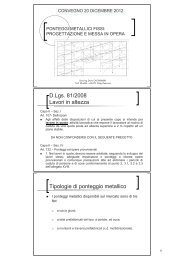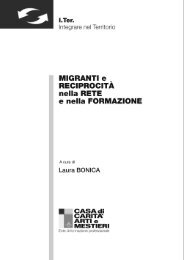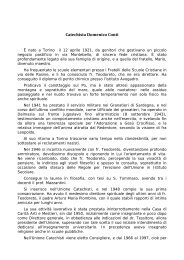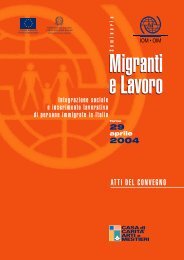Rapporto finale/ Final Report (ITA-ENG) - Casa di Carità Arti e Mestieri
Rapporto finale/ Final Report (ITA-ENG) - Casa di Carità Arti e Mestieri
Rapporto finale/ Final Report (ITA-ENG) - Casa di Carità Arti e Mestieri
You also want an ePaper? Increase the reach of your titles
YUMPU automatically turns print PDFs into web optimized ePapers that Google loves.
INTRODUCTION TO THE RESEARCH REPORT 2<br />
The Cross Community Schools project falls within the scope of a long-term European research<br />
programme: from the fun<strong>di</strong>ng of projects to develop the model of a “culturally inclusive school” to<br />
recommendations and guidelines issued in recent years by the European Parliament and European<br />
Commission3 , the main aim has always been to promote truly inclusive and cohesive educational<br />
systems, as the only way to address the increasing <strong>di</strong>versity of the school population and the<br />
problems of racism and xenophobia, and promote <strong>di</strong>versity and achievement for all4 . The European<br />
Commission already supports a number of programmes and actions relating to this issue5 , promoting<br />
international debate and reflection. Examples include the common agenda for integration - framework<br />
for the integration of third-country nationals in the European Union6 . The document, issued in 2005,<br />
proposes measures for putting the common basic principles on integration into practice, together<br />
with a series of supportive European mechanisms such as the National Contact Points on Integration7 ,<br />
the European Integration Forum and annual reports on migration and integration. The European<br />
Fund for the Integration of third-country nationals facilitates the adoption of measures supporting<br />
integration, while numerous “Lifelong learning” programmes support projects related to intercultural<br />
education, school integration of migrant students and social inclusion for <strong>di</strong>sadvantaged youth.<br />
Structural funds, such as the FSE and the FESR, are available to sustain projects and measures that<br />
foster social inclusion at national and regional level since, accor<strong>di</strong>ng to the aforesaid 2008 Green<br />
Paper, “if education systems do not act to integrate migrants they have the potential to exacerbate<br />
ethnic <strong>di</strong>visions, segregation and to contribute to the socio-economic <strong>di</strong>sadvantage experienced by<br />
many migrant groups. On the other hand, if education systems are successful at integrating migrants<br />
then this can have a positive impact on social cohesion and on economic outcomes both for migrants<br />
and for the economy as a whole”.<br />
The project thus falls within this European framework of response actions to combat <strong>di</strong>scrimination in<br />
education systems. Specifically, it is concerned with developing activities to identify and train people<br />
to act as ASI (Anti-Stereotype and Intolerance) coor<strong>di</strong>nators within the various contexts, conducting<br />
an experiment involving the creation of de<strong>di</strong>cated spaces (referred to as Dialogue Spaces) in schools<br />
where Student Teams can exchange opinions and address the issue of <strong>di</strong>scrimination. These actions<br />
were implemented very <strong>di</strong>fferently in the various countries involved, depen<strong>di</strong>ng on the problems at<br />
issue, the teachers and pupils taking part and the type of context. It was therefore possible to examine<br />
<strong>di</strong>fferent approaches. By comparing and carefully analysing these, we were able to identify the most<br />
suitable ways of combating stereotypes, a challenge that is of fundamental importance in the various<br />
education and vocational training contexts in Europe.<br />
3 Cf. for example NESSE (2008) Education and Migration: Strategies for Integrating Migrant Children<br />
in European schools and Societies (Brussels: EC)<br />
4 Green Paper, Migration and mobility: challenges and opportunities for EU education systems, European<br />
Commission, July 2008 (EC Brussels).<br />
5 Cf. the various country reports by the European Commission against Racism and Intolerance in schools.<br />
These are available to download from: http://www.coe.int/t/dghl/monitoring/ecri/library/publications_en.asp<br />
6 COM/2005/389<br />
7 Council Document 14615/04<br />
2 The Research <strong>Report</strong> was drawn up by Elena Carli from S.R.F.<br />
50







